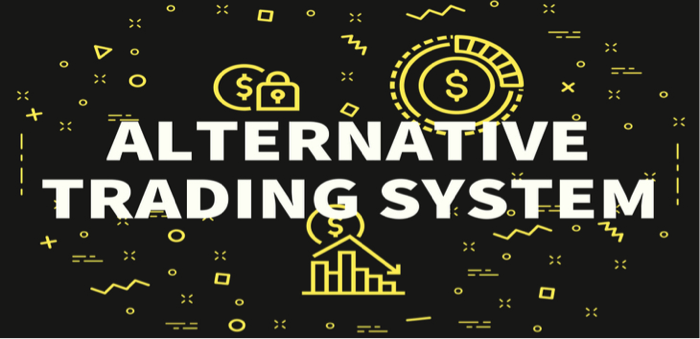
Contents
- What is an Alternative Trading System (ATS)?
- Understanding Alternative Trading Systems
- What Do Alternative Trading Systems Do?
- Examples of Alternative Trading Systems
- Conclusion
- FAQs
What is an Alternative Trading System (ATS)?
An alternative trading system (ATS) is a non-exchange trading platform that has been recognized by the Securities and Exchange Commission (SEC) but is not regulated in the same way exchanges are.
On this trading platform, buyers and sellers are matched to find willing counterparties. ATS is a service that allows investors and traders to match their orders. Alternative trading systems are widely used in the United States and Canada. However, they are recognized as broker-dealers.

The most commonly used alternative trading systems in the US are the Electronic Communication Networks (ECNs). ECNs are automated processes that connect buy and sell bids in the market instantly.
Please note that North Americans use the term “ATS,” while Europeans use Multilateral Trading Facility (MTF).
Understanding Alternative Trading Systems
Alternative trading systems play a vital role and are responsible for a large portion of the volume in publicly listed securities across the world. In Europe, they’re referred to as multilateral trading facilities, ECNs, cross networks, and call networks. Many ATS are licensed as broker-dealers instead of exchanges, and their primary goal is to identify transaction participants.
ATS, unlike certain national exchanges, does not set rules governing subscriber behaviour or discipline subscribers other than by denying them access to the trading venue. They’re vital since they provide an alternative means of getting money.
Instead of trading large blocks of securities on national securities exchange, institutional investors may utilize an ATS to discover peers for trades. Although ATS transactions do not reflect on national exchange order books, these moves may be intended to hide trade from the general public. The use of an ATS to perform such orders has the advantage of reducing the domino effect that huge trades may have on an equity’s price.
Also Read: What Are Trade In Derivatives?
What Do Alternative Trading Systems Do?
Alternative trading systems (ATS) are used in public markets to monitor liquidity in the market, or how fast an asset may be exchanged for goods or services. It is a substitute for traditional stock exchanges.

An ATS is especially advantageous for persons who do a lot of trading, like investors and professional traders, because it avoids the misreporting of the market price that occurs on traditional stock exchanges.
Because ATS trading is not publicly visible and does not appear on national exchange order books, this is the case. Aside from the norms controlling behaviour, there are less regulations to follow.
Examples of Alternative Trading Systems
There are several examples of ATS, and they include:
Electronic Communication Networks
Electronic Communication Networks (ECN) are an ATS that allows big brokerages and traders to exchange securities without dealing through an intermediary. As a result, merchants from all around the world may effortlessly carry out transactions.
Traders can make transactions based on off hours’ information since the system permits trades to take place outside of typical stock exchange trading hours. ECNs generate money by collecting entry fees and charges for each transaction, which is a disadvantage for traders because per-transaction expenses may quickly build up.
Dark Pools
Dark pools are a form of alternative trading system that is contentious since the transactions are done behind closed doors, obscuring the operations.
Institutional investors, such as mutual funds, retirement funds, and insurance firms, sometimes use private exchanges to trade a huge volume of securities through block transactions.
Crossing Networks
Similar to dark pools, crossing networks allow trades to happen outside of the public eye. Since the details of the trade are not relayed through public channels, the security price is not affected and does not appear on order books.
Often, the accounts in which the trades are conducted can be anonymous, which is highly advantageous for traders. It should be noted that dark pools and crossing networks are legal, although they’ve undergone scrutiny by the financial press and news outlets in recent years.
Call Markets
Call markets are a type of ATS in which trades are grouped collectively until a certain quantity is achieved before the transaction is completed. As a result, trades are carried out at regular intervals.
The market-clearing price in a call market is determined by the quantity of securities issued and negotiated on by the sellers and buyers, correspondingly.
Auctioneers are an important part of call markets since they are in charge of balancing supply and demand for a traded security before reaching an average clearing price, or the cost at which market trades are exchanged.
Auction markets, as opposed to call markets, perform deals immediately a buyer and seller are discovered who decide on a certain price for the securities.
Also Read: Psychology of Market Cycles
Conclusion
An alternative trading system is an automated marketplace that matches traders’ buy and sell orders with peers. Although ATS is not a countrywide exchange, it is required by the SEC to be regulated and licensed. ATSs are not regulated as platforms, but rather as broker-dealers.
Electronic communication networks, dark pools, crossover networks, and phone markets are all instances of alternative trading systems. Dealers use them all the time to discover counter-parties for trades.
ATS are particularly handy for investors and successful traders who deal in huge numbers. One of the key advantages of using an alternative trading system to trade huge volumes is that you avoid distorting the market price as you would with traditional stock exchanges.
Aside from the regulations controlling behaviour, there are fewer restrictions that subscribers must observe.
FAQs
Are ATSs regulated by securities and exchange commission?
Alternative Trading Systems (ATSs) are computerized trading systems authorized by the Securities and Exchange Commission (SEC) that pair orders for buyers and sellers of securities. An alternative trading system (ATS) is not the same as a national securities exchange. An ATS, on the other hand, can petition the Securities and Exchange Commission to become a national securities exchange.
How does an alternative trading system work?
ATS, unlike certain federal exchanges, does not impose regulations limiting users’ behaviour or sanction them other than by banning them from trading. Instead of trading big blocks of securities on local stock exchanges, institutional investors can utilize an ATS to discover peers for transactions.
Are dark pools legal?
Dark pools are lawful and supervised by the SEC, but they’ve expressed worries among policymakers in the past because they can provide unfair informational advantages to the few corporate traders that conduct the most of dark-pool deals, which can be used to front run transactions.
Why is a dark pool legal?
Dark pools are secret markets where investors can trade securities that are not available to the general public. Dark pools were designed to make block trading easier for institutional investors who didn’t want their massive orders to disrupt the markets and result in lower prices for their trades.



